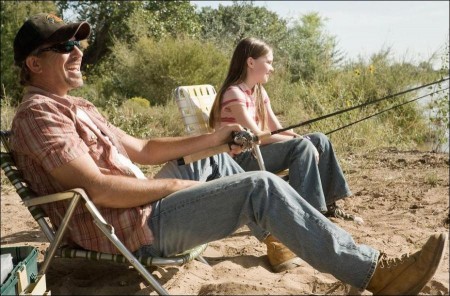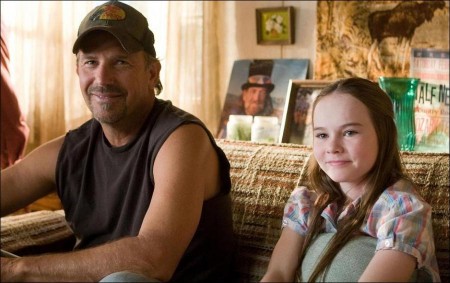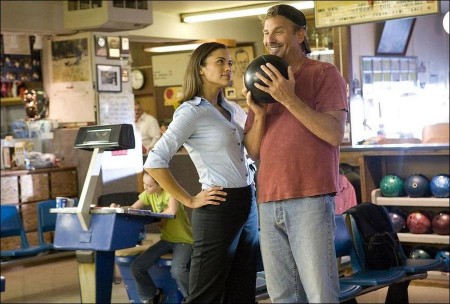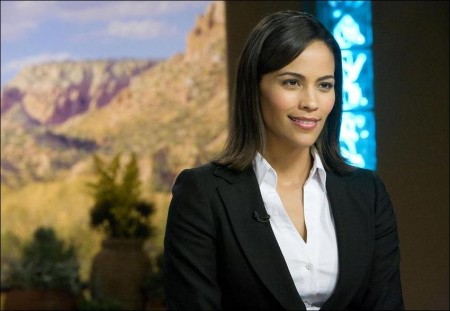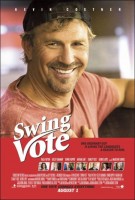Tagline: Just when you think your vote doesn’t count, it turns out it’s the only one that does.
Bud Johnson (Kevin Costner) is an apathetic, beer-slinging, lovable loser who is coasting through a life that has nearly passed him by. The one bright spot is his precocious, overachieving 12-year-old daughter Molly (Madeline Carroll). She takes care of both of them, until one mischievous moment on Election Day, when she accidentally sets off a chain of events which culminates in the election coming down to one vote … her dad’s.
“Swing Vote” is a comical look at the journey of a father and daughter who discover that everyone has the power to change the world. Joining the cast are Kelsey Grammer as Republican incumbent President Andrew Boone, and Dennis Hopper as Democratic hopeful Donald Greenleaf. Nathan Lane portrays Art Crumb, Greenleaf’s Democratic campaign manager who has lost seven elections, and Stanley Tucci plays Martin Fox, the slick campaign manager to the Republican President. Paula Patton takes on the role of local small-town TV reporter Kate Madison, who has aspirations for a big-time network news job, and George Lopez is her “seen-it-all” boss John Sweeney, who manages the local Texico, New Mexico, TV station.
The Primaries: Putting Story First
Long-time friends, writer/director Joshua Michael Stern and writer Jason Richman had always wanted to work together, but it wasn’t until Richman threw out an idea that they were both passionate about that they decided to dive in. “It’s hard to write with somebody,” says Stern. “But it really worked. It was a dream-writing scenario.”
The idea was a comedic look at this country’s political process, seen through the eyes of a small-town girl and her apathetic dad. “We felt it was important to write something that had some meaning beyond just the entertainment factor of the comedy,” says Stern. “Our goal was to write a movie about a father and a daughter. The political craziness and chaos was almost a secondary story.”
The idea caught the attention of Kevin Costner, both as a producer and as an actor, for its comic elements and believable characters. “It felt cinematic and I liked it immediately,” recalls Costner. “I didn’t really dance around. They’ve done a brilliant job with this comedy and I think you could put this in the same category as `Tin Cup’ or `Bull Durham.’ It doesn’t stay a pure comedy. There are moments that have an emotional bottom and it adds to the experience. It’s fun and funny but there are moments where, you know, your heart can break a little bit.”
Oscar-winning producer Jim Wilson, Costner’s producing partner since “Dances with Wolves,” agrees. “The first few pages absolutely grabbed me because it wasn’t about politics at all,” recalls Wilson. “It was about a single father raising a 12-year-old daughter and their relationship. And the dialogue, the banter between these two is great.”
“It’s very much a `Paper Moon’ story,” says Stern. “We follow the relationship between a father and daughter and how they deal with the chaos that surrounds them.”
“Comedy is always part of everything I do because it’s a natural human reaction,” adds Richman about the tone of the script. “But I think the most important thing in this movie – and the most difficult – is truth.”
The writers felt strongly that if they were going to write about politics, that the story had to be based in reality. “The 2000 election was quite a snafu,” notes Richman about the initial inspiration for the story. “It really drove home the simple idea that every vote counts because it was so incredibly close.”
Adds Stern, “We thought that if an entire election could come down to a district in Florida – some 500 votes – and a gubernatorial race in Oregon could come down to 30 votes – we could create a believable election that came down to one vote.”
Stern says the filmmakers didn’t want to take sides in the film’s political story. “If there’s a message to this film beyond the comedy and the relationships,” he says, “it’s that every vote counts.”
Costner concludes, “I saw a billboard about eight years ago and it really stuck with me. It said, `92 million people in last year’s election made a difference. They didn’t vote.’ It was so profound it was devastating.”
The Election: Finding the Perfect Candidates
“I thought it would be great to just take Kevin and kind of deconstruct his persona – his iconic movie-star persona – and just let him be a guy.” ~ Joshua Michael Stern, Director
With more than 100 roles to fill, the process of casting might have been a bit arduous, but the pieces fell into place rather quickly, beginning with the film’s protagonist, Bud Johnson.
“Bud Johnson represents a lot of people out there,” notes Richman. “He’s a person who just hears white noise coming from the political system – he’s heard a lot of promises over the years, and he’s sort of given up on the system. That’s what was so fun about putting a character like that in the center of the storm.”
Stern knew from the beginning who he wanted for the role. “I always thought Kevin Costner would be great. He’s so good at playing the everyman – the guy that everyone relates to,” says Stern. “I thought it would be great to just take Kevin and kind of deconstruct his persona – his iconic movie-star persona – and just let him be a guy.”
Costner was intrigued with the everyman role. “Bud is a classic American character,” says Costner. “He’s kind of a ne’er-do-well – a likeable rascal but flawed. He’s also a careless human being in the sense that he’s drifted in his life, moves from job to job, was married at one point and now has a fifth grader he’s raising who kind of runs the house.”
As “Swing Vote” unfolds, Bud is courted by heavyweight politicos and their right-hand men, who add to the comedy and are key to making the story work.
But who would be President? Costner was quick to suggest Kelsey Grammer. “I had this really strong feeling about Kelsey – he has a presidential air about him and he’s such a good actor,” he says. Stern agrees, adding that he could easily envision Grammer in the White House. “He’s got that vibe. He could run for President,” says Stern, who describes Grammer’s character as “a bit dim.” “But he brought something completely different to it, something very sincere.”
Grammer, a multiple Golden Globe and Emmy Award winner best known as the beloved character Frasier on the acclaimed series “Cheers” and “Frasier,” signed on immediately. “I really enjoyed the way it sort of lampooned the whole political process, and paid equal shrift to Republican and Democratic candidates,” says Grammer. “It points out the foibles in both and actually does encourage us to believe in the political process based upon the fact that a man might actually see the light from time to time.”
As for his character Andrew Boone, Grammer sees him as quite a complex man who is a dedicated public servant and an optimist with a belief in the American people. “But he also is a man of political expediency and ambition,” adds Grammer. “There’s something hopeful and wonderful about him – and there’s something formidable about him as well because he understands that he has power, he understands that he has a responsibility to do good with power.”
But Grammer still finds a way to bring out the comedy in the role. “In this case, one man’s vote is going to decide the Presidency,” says Grammer, “and that actually is a great engine to drive a lot of foolish behavior.”
Stern particularly liked the surprise Dennis Hopper promised. “Casting him as the Democratic contender was amazing. He looks so distinguished, but he mixes it up a little bit. He’s unexpected and I think that’s always fun for an audience. It’s fun to see people you’ve liked in the past up there doing something new.”
Indeed, Hopper’s roster of film credits includes some of Hollywood’s most classic film titles – from “Rebel Without a Cause” to “Easy Rider” to “Hoosiers” – and, likewise, some gritty roles. So casting the actor as the Democratic hopeful offered a bit of a twist. Hopper’s character, Donald Greenleaf, has the dignity and determination of a typical political candidate, but like President Boone, Greenleaf has trouble committing when the election is at stake.
Hopper embraced the role. “I just really enjoyed the script,” he explains. “I’m really proud to be in this movie and it’s great to work with Kevin again. It’s been quite awhile.” In fact, it had been 12 years since he worked with Costner on “Waterworld.”
“We were so happy when Dennis decided to play Greenleaf,” says Costner. So the next step was surrounding the Presidential candidates with their right-hand men. Stern explains that at this point, casting was all about pairing people up. “It’s asking, `Who would be an interesting contrast to Dennis Hopper?’ And the answer is instantly `Nathan Lane.’”
Hopper compares Greenleaf and Lane’s Art Crumb to Abbott and Costello – with Hopper the straight man to Lane’s Costello. “Nathan Lane is one of the funniest men I’ve ever worked with,” says Hopper, “but both of us played it straight. It’s just that the circumstances were funny.”
“I don’t see it as such a comedic role,” adds Lane. “It has its moments of humor but, essentially, I don’t think of it as a funny role even though they seem to be laughing when we’re doing scenes. We’re playing them serious.”
Lane was drawn to the story, which he characterizes as “smart, funny and certainly timely.” But most of all, he liked the character, Art Crumb, who is the Democratic contender’s campaign manager. “He’s probably a workaholic,” comments Lane, “and has gone from campaign to campaign but has not had a lot of luck so he’s a little bitter about these past experiences. His need to win is so important and that’s an interesting thing to play.”
Crumb’s counterpart on the Republican team is campaign manager Martin Fox. “I think there’s a respect between them even though my character doesn’t particularly like Fox,” says Lane. “He finds him to be very slick. But they’ve been in the trenches together so there is a kind of strange friendship and a certain camaraderie.”
The role of Martin Fox went to Stanley Tucci, who Stern felt was an ideal complement to Grammer’s character. Like the others, Tucci had high praise for the script but also had another incentive for taking the role – Nathan Lane. “I think he’s a wonderful actor and working with him was one of the reasons I signed on,” says Tucci.
Tucci plays a ruthless perfectionist who will stop at nothing to get what he wants. “I like characters that are so intense and so focused on what they do that they’re sort of innately comic. Because they’re myopic, their behavior becomes somewhat extreme, in a way that can be either very scary or very funny.” And in this case, it’s definitely to comic effect. Says Tucci, “I haven’t read or seen a good political comedy in a long time.”
Costner was an instant fan of the presidential foursome. “With all of these guys, I don’t want to call them scene-stealers but they’re so good at their craft that they really can command a screen,” he says.
They weren’t the only ones. Newcomer Madeline Carroll, a sixth grader from Simi Valley, Calif., was cast in the role of Molly Johnson, the little girl who sets everything in motion. The part called for a young actress with the guts and emotional range to play in scenes opposite the likes of Costner, Grammer, Tucci and Lane. Yet, without an extensive resume, Carroll captured the hearts of the producers – and the director. “We found her through an open call. She was that little miracle where you find someone who is exactly the character on the page and you think, `Okay, that’s it.’”
According to Stern, much of the film relied on the success of the father-daughter relationship. “The biggest reward is that the relationship in the movie works,” he says. “To me, that was the biggest challenge that turned out not to be a challenge at all.”
Carroll, who had small roles in “Resident Evil: Extinction,” “The Santa Clause 3: The Escape Clause” and “When a Stranger Calls,” as well as some television credits and commercials, had read enough scripts to know a good role when she saw it. “When I read this, it just hit me like a ton of bricks,” she says. “It was so powerful, I cried. And it’s a great comedy, mixed with every emotion.”
Co-writer Richman says the character – 12-year-old Molly – is wise beyond her years, “the one true guiding light in this story – the one person whose ideals have not been set off course. And she’s a believer, trying to inspire her dad.”
“She’s trying to get her dad to vote,” adds Carroll. “That’s all she wants. She’s trying to get him to pay attention to the world – to get involved – and he just doesn’t care.”
Kate Madison cares. A local Texico, New Mexico, TV news reporter, the character is itching to find the story that will catapult her onto the national media stage. When it came time to cast the role, Stern called on Paula Patton – literally.
“The character was from a small town – she was really perky and fresh faced,” says Stern of Kate Madison. “I loved Paula Patton. She did `Déjà Vu’ and played it very organically and real. I spoke with her on the phone – and though I’d never hired anyone off of a phone call, I just knew. She’s got something and she’s fresh.”
Patton was intrigued by the character. “When we find her, she’s just doing kind of unimportant stories like what fifth graders think about voting on Election Day,” explains Patton. “And then she stumbles upon a great story, one for the history books, really.”
This great story – the election too close to call, all resting on the vote of one of her fellow Texico, New Mexico, residents – seems like a sure catalyst for her career. “Kate gets to interview Bud and suddenly prospects for getting out of Texico become quite great,” adds Patton.
Patton says she appreciated the film’s potential for comedy from the moment she read the script. “I was just amazed,” she recalls, “because it’s really difficult to make somebody laugh when they’re reading. And I laughed out loud.”
Completing the cast is George Lopez as John Sweeney, Kate Madison’s boss and station manager of the local TV station where Bud’s story breaks; Judge Reinhold as Walter, one of Bud’s buddies; and Mare Winningham as Molly’s estranged mother Larissa.
Rounding Out the Cast with Familiar Faces
To keep the story grounded in the real world, the film is peppered with high-profile cameos, including NASCAR racing legend Richard Petty, the great American singer/songwriter Willie Nelson, and television personality Mary Hart (“Entertainment Tonight”).
Driving the political angle home is a host of political pundits who joined forces with the filmmakers without hesitation. “Josh and I had a great time casting the political hosts and pundits,” says Executive Producer Jonas. “Every time we sent the script to one of these folks, they fell in love with it. The most common reaction was that it was very Capra-esque, sort of a reverse `Mr. Smith Goes to Washington,’ which is delightful to hear.”
“It was a political junkie’s dream,” adds Stern, who was impressed that these non-actors pulled off their roles in the film. “Punditry is off the cuff,” he says. “They were just on.”
Tapped for the film were:
Aaron Brown – anchor of the PBS series “Wide Angle,” a public affairs series with a global focus
Campbell Brown – anchor of “CNN Election Center,” the network’s daily examination of news from the campaign trail
Tucker Carlson – MSNBC’s senior campaign consultant
James Carville – political commentator formerly on “Crossfire”
Matt Frei – BBC’s Washington, D.C., correspondent and presenter of “BBC World News America”
Arianna Huffington – co-founder and editor-in-chief of The Huffington Post, a nationally syndicated columnist, author of 11 books and co-host of “Left, Right & Center,” public radio’s popular political roundtable program
Anne Kornblut – staff writer for The Washington Post
Bill Maher – HBO’s Emmy-nominated host of “Real Time with Bill Maher,” author of The New York Times best-selling book, “New Rules: Polite Musings from a Timid Observer”
Chris Matthews – host of MSNBC’s “Hardball with Chris Matthews” and “The Chris Matthews Show,” a syndicated weekly news program
Lawrence O’Donnell – MSNBC political analyst who appeared on “The McLaughlin Group” and “The Al Franken Show”
The Campaign Trail: Location, Location, Location
Bud and Molly live in Texico, New Mexico, where their day-to-day life is pretty ordinary, low key and uneventful. The actual Texico is a tiny town in Curry County on the Texas/New Mexico border 10 miles due east of Clovis – a little too out of the way for a motion-picture production. So the filmmakers needed a town double. “We found a great town south of Albuquerque which had virtually been abandoned,” says Stern. “So we could really take it over. The people who still lived there were very gracious to us.”
The town was so perfect, in fact, that it offered the director greater flexibility, with no worries about which aspects of the town worked and which didn’t – because everything he saw just “fit.” Says Stern, “The great thing about shooting in a location straight from the script is that your camera can see everywhere. If something falls into the frame, it gives it more breadth. It freed me up to shoot how I wanted to shoot the film, with no restrictions.”
In the film, when the unstoppable war machines of the two political parties learn Bud Johnson’s identity, they invade this small town to battle for his attention, and more importantly – his vote – whatever the cost. The circus-like atmosphere required a considerable coordinated effort for the production to keep things believable as the town is overrun by media outlets, campaign supporters, special-interest groups and lookie-loos.
For production designer Steve Saklad, this meant the colliding of two very different worlds. “We really wanted to express what it was like to live in that small town before the onslaught,” says Saklad. “Once the outside forces arrive, there’s an explosion of red, white and blue in this very beige, neutral little town.”
When the outside world starts taking over with rallies and demonstrations, Saklad took particular pains to present all sides of the political spectrum. “At our street-fair scene,” he explains, “we were careful to balance ACLU with the Minutemen Militia, the right to life with the right to choose. We wanted it clear that we were taking no particular side in the telling of this story.
“One of the great things about the script,” continues Saklad, “is the way the series of public rallies build in size. We had great fun creating a small-scale rally for Greenleaf in Vermont, then a bigger event for President Boone, and finally the extraordinary gala in Texico transformed by Hollywood designers for the occasion.”
Keeping Score: The Music
Academy Award-nominated composer John Debney (“The Passion of the Christ,” “I Know What You Did Last Summer”) created the original score for the movie.
“I wanted to create a theme for the film that captured the simple elegance and nobility of Kevin Costner’s character and his journey through the film,” says Debney. “I started the process of writing this score by focusing on the main title sequence. The visuals are rich and vibrant and I strove to create the most simple and elegant theme that I could. What came through was a very Americana theme stated first by solo piano, then strings and woodwinds.
“Much of the score was `rural’ in color, utilizing guitars, dulcimers, accordion and other folk instruments,” Debney continues. “In particular, Kevin’s character is represented in a bluesy way, with slide guitar and rhythm section. The character of Molly is much more childlike, utilizing celeste and harp with woodwinds. Molly’s character is the moral compass of the film and her music is simple and sincere and a bit wistful.”
According to the composer, Stern guided him through the process, aiming for a country flavor without it becoming a country-western score. “The intent was to give the feeling of rural locale without becoming too `southern.’”
The film also features a live band headed by Costner’s character. When Bud attends a party thrown by the Democrats, he finds himself center stage – literally. “They’re thinking, `How do we keep Bud happy?’” says Costner. “And so they give him the stage.” Known in the movie as the Half-Nelsons, the band performs mostly cover versions of Willie Nelson songs along with some original music.
This wasn’t a stretch for Costner, who is no stranger to singing, playing or fronting a band. He records, tours and performs regularly with the six other band members of Modern West. In addition to playing guitar and singing lead vocals, he also writes songs with the group. This gave them the perfect opportunity to write some songs inspired by “Swing Vote.” “Songs that Bud could have written,” says Costner. “And out of that, a few songs find their way into the film, whether it’s the credit sequence or in the movie itself. I think it adds a little bit extra to the movie that one might not have expected.”
Two of the Modern West songs from the film will be featured on the “Swing Vote” soundtrack: “Backyard” and “Hey Man What About You?” The soundtrack, scheduled for digital release by Hollywood Records on July 29, 2008, also features a variety of musicians, including Willie Nelson, Moby, The Marshall Tucker Band and David Gilmore.
Production notes provided by Touchstone Pictures.
Swing Vote
Starring: Kevin Costner, Dennis Hopper, Nathan Lane, Kelsey Grammer, Stanley Tucci, George Lopez, Madeline Carroll, Paula Patton, Judge Reinhold
Directed by: Joshua Michael Stern
Screenplay by: Joshua Michael Stern, Jason Richman
Release Date: August 1st, 2008
MPAA Rating: PG-13 for language.
Studio: Touchstone Pictures
Box Office Totals
Domestic: $16,284,360 (97.0%)
Foreign: $509.512 (3.0%)
Total: $16,793,872 (Worldwide)
